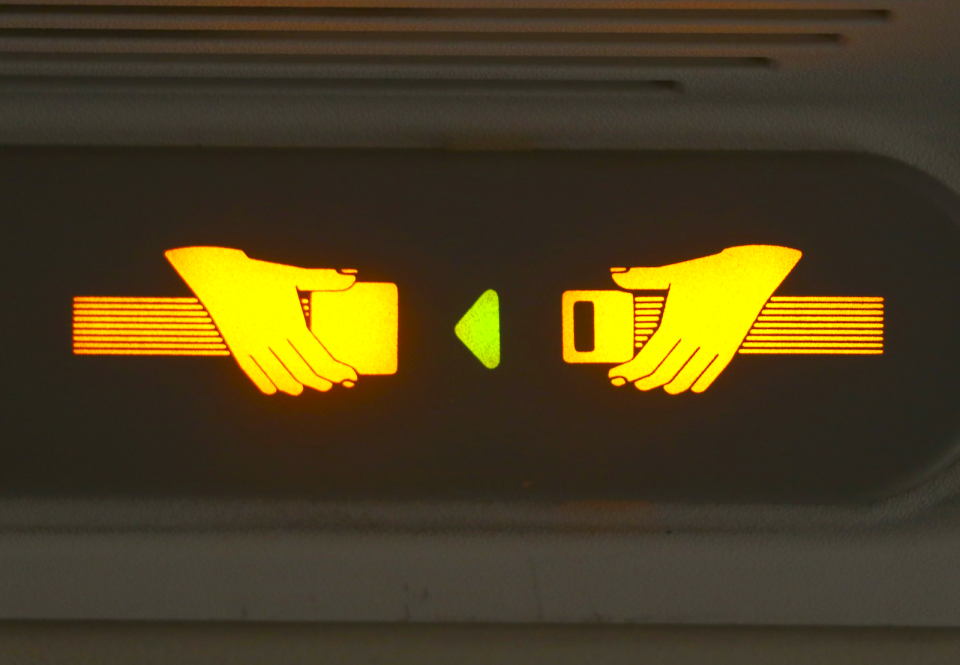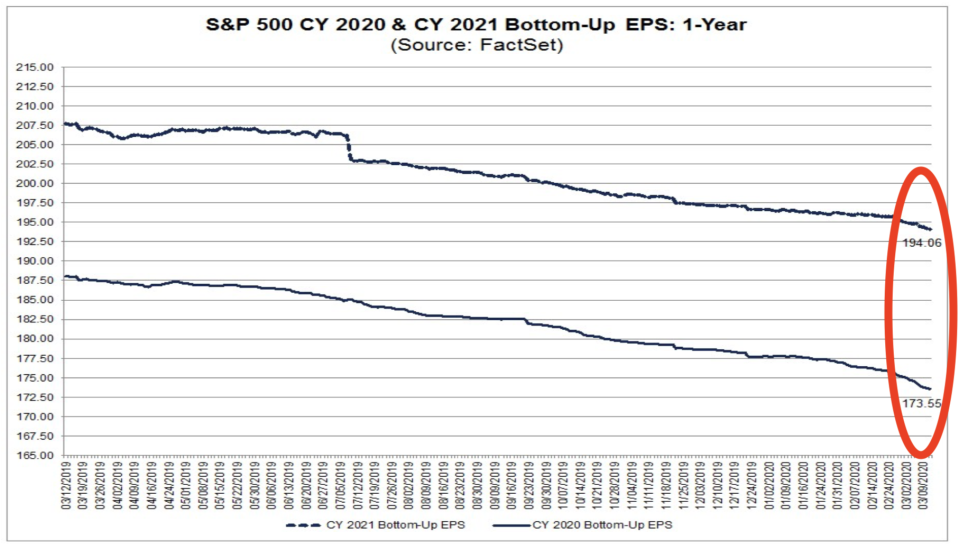Brace for earnings numbers like you've never seen before
In the coming weeks, Corporate America will be announcing Q1 financial results and many companies will also offer guidance on what they expect in the near future.
Considering the unusually disruptive nature of the coronavirus pandemic, many companies will preempt those Q1 reports with pre-announcements previewing what sales and earnings will look like.
Expect all those numbers to be bad.
But first, you should know that most analysts covering these companies have yet to make notable adjustments to their earnings forecasts. According to data compiled by FactSet, analysts estimate Q1 earnings for the S&P 500 (^GSPC) to have declined by just 1.2% year-over-year. This despite the world economy being in the throes of the COVID-19 crisis for nearly half of the period.
Let’s consider some of the bad news we’ve gotten from Corporate America in recent weeks.
Cruise lines, airlines, and the whole leisure and hospitality industry have been getting slammed due to social distancing and unfortunate incidents that are changing behavior. Movie theaters, amusement parks, and sporting events are also suffering as they limit attendance, cancel events and close doors. Warren Buffett recently told Yahoo Finance that people were driving less and in turn getting into fewer car accidents, which could affect auto sales, auto repair activity, and gasoline demand for that matter.
With economic activity seizing up, demand for energy has been down (see cruises, airlines, and autos above), which eventually led to Saudi Arabia triggering an oil price war, which sent crude crashing. And with crude prices down, expect plenty of bad news from oil majors, drillers, and the banks that finance these activities. Speaking of banks, in addition to loans going bad, they’re gonna get hit by rapidly falling long-term interest rates which are likely to squeeze net interest margins. And we haven’t even talked about manufacturing shutdowns across Asia, disrupting supply chains that have been bad news for companies ranging from industrials to big tech to sneakers.
And it gets scarier.

So far, the conversation about the coronavirus’s impact on business has largely been about demand, which usually means sales (aka revenue or the top line).
But these quick swings in sales tend to amplify swings in earnings.
Operating leverage and financial leverage: how euphoria quickly turns into pain
The sudden nature of the outbreak and what's likely to be confirmed as a rapid drop in economic activity have given companies very little time to make operational and financial adjustments to absorb the drop in the top line. And that's bad news for the bottom line.
You see, a lot of a companies’ operating expenses are fixed. Employee salaries, lease payments, insurance premiums, depreciation expenses... all of those things can't be changed quickly.
And then there are the financial expenses. The big one being interest expenses on borrowed money. Lenders lend because they expect to collect interest and recover that principal on unforgiving fixed schedules.
Finance nerds refer to the former as operating leverage and the latter as financial leverage. The degree of operating leverage and/or degree of financial leverage determines to what degree an increase or decrease in revenue amplifies an increase or decrease in earnings.
Every company has some exposure to this. It's often why a company with a 10% increase in revenue will also see a 20% jump in earnings. And it's also why investors should expect even modest declines in revenue to translate into sharp drops in earnings.
With stocks crashing 27% into bear market territory from Feb. 19 to March 12, it's unclear to what degree investors and traders may have priced in potentially bad news.
But we do know that estimates for earnings have yet to be fully recalibrated.
“Estimates are falling, but prices are falling faster,” Morgan Stanley’s Michael Wilson wrote on Monday. “Sell-side numbers are beginning to react to economic realities as 2020 numbers have come down ~1.5%.”

Goldman Sachs’ David Kostin, who on Wednesday substantially slashed his forecast for earnings, explained:
“Analysts have been slow to incorporate the negative impact of the coronavirus pandemic on company EPS estimates,” Kostin wrote on Friday. “Analysts expect 2Q growth of +2% and 3Q growth of +7%. Analysts are constrained by the uncertainty of the outlook and the dearth of management guidance, but eventual downward revisions will be catalysts for lower stock prices.”
It’s an understatement to say these are extremely volatile times. Every single day of last week saw the stock market make a move no smaller than 4% on its way up or down. On Monday, the market crashed 12%.
For now, it will remain a dangerous market with big swings as we await more clarity.
—
Sam Ro is managing editor at Yahoo Finance. Follow him on Twitter: @SamRo
Read more:
Why Warren Buffett’s 2008 message to investors was perfectly timed
Why a big market rally right now is no reason to get excited
Something dangerous is happening beneath the surface of the selloff
The incredibly bullish force investors can’t afford to ignore
Follow Yahoo Finance on Twitter, Facebook, Instagram, Flipboard, LinkedIn, and reddit.
Find live stock market quotes and the latest business and finance news
For tutorials and information on investing and trading stocks, check out Cashay

